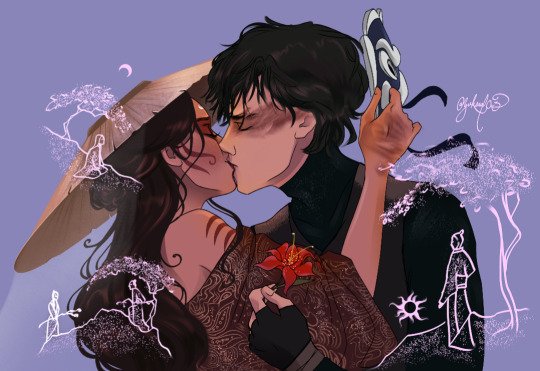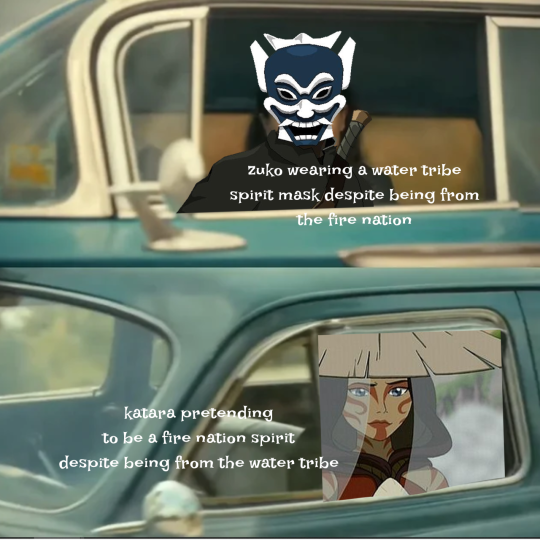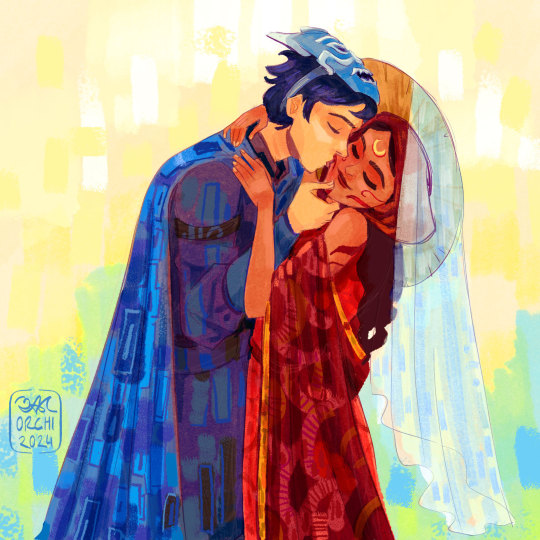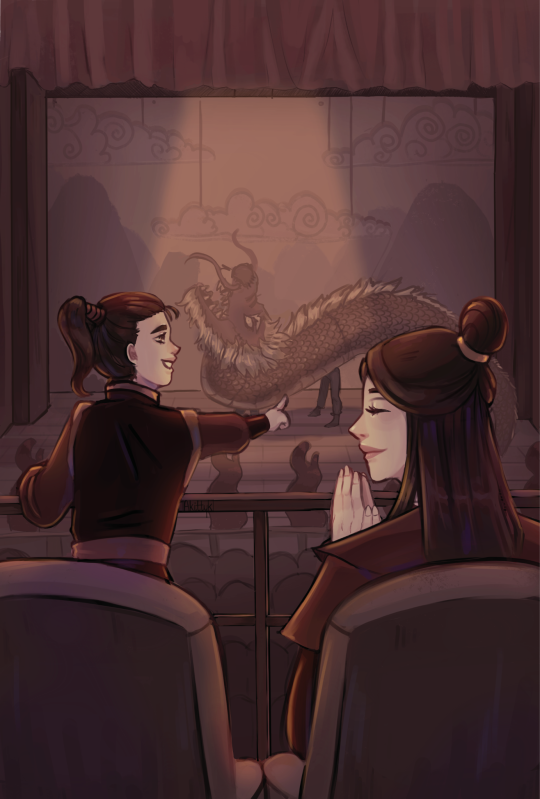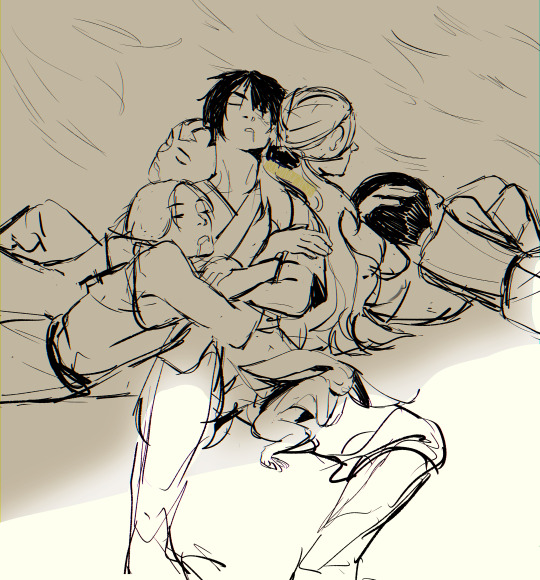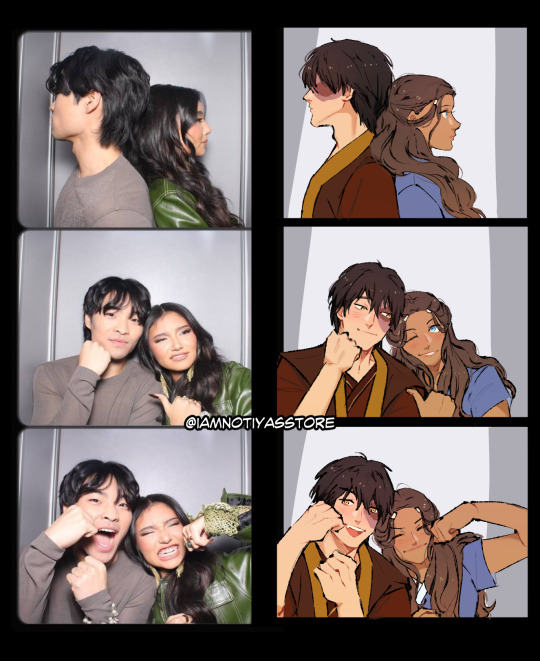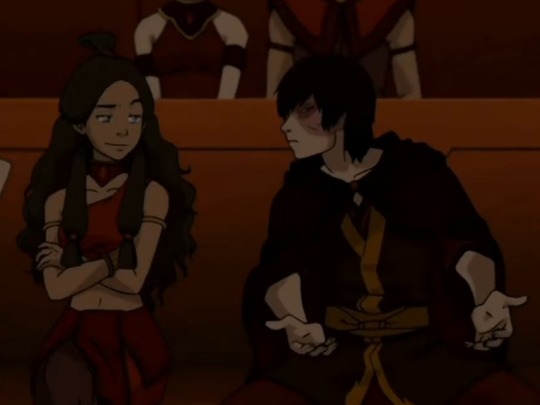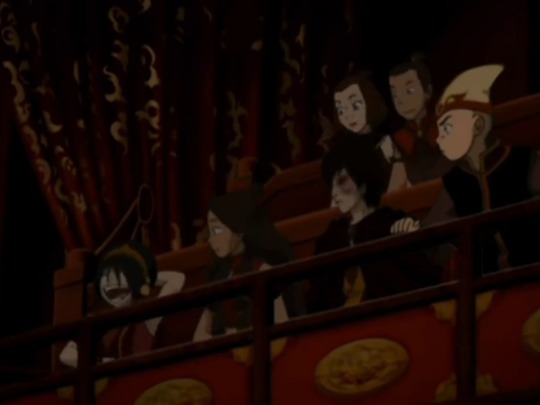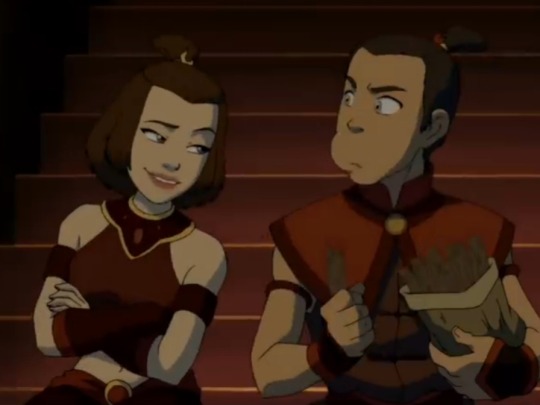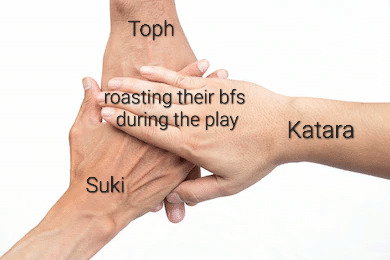Text
Something that I think ppl who ship both sukka and zutara don't acknowledge enough is the fact that poor Hakoda met both his kids' future spouses on the same day, in the same place and that place just happened to be prison.
1K notes
·
View notes
Text


Sharing cultures + lots of teasing
Their banter is one of the many things about this ship that I absolutely love <3
3K notes
·
View notes
Text
ana's meta masterlist
Pro-Zutara:
the official zutara dissertation: part 1 | part 2
zuko, aang and taking lightning for katara
zutara and romantic coding
"you rise with the moon, i rise with the sun" is a zutara line
zutara and thematic significance
zutara vs jetara
zutara parallels in the awakening
zutara's narrative culmination
zutara in the crossroads of destiny:
azula vs katara
love as resistance in the catacombs
zutara in the southern raiders:
the true source of katara's anger at zuko
katara bloodbending before zuko
the narrative relevance of zutara
zutara and bloodbending
zutara's narrative symmetry
why zuko had to betray katara in ba sing se
Anti Anti-Zutara:
the official zutara dissertation (p.3)
"zutara would face too much opposition from their countries"
"zuko and katara are a colonizer/colonized ship"
"zuko and katara would fight all the time”
"platonic zutara is better than romantic zutara"
"fire lady katara is racist"
“zuko would’ve taken lightning for anyone”
ATLA Ship Criticism:
the official zutara dissertation: part 4 | part 5 | part 6
why mai.ko was never intended to be canon
why mailee is a better ship than mai.ko
how kat.aang could've been fixed
kat.aang's lack of trust in the southern raiders
emotional labour in kat.aang
kat.aang’s narrative imbalance
comparing katara and aang's parenting
ATLA/LOK:
azula/katara parallels
katara's choice in the crossroads of destiny
was zuko's betrayal in-character?
zuko's comments in the southern raiders
zuko's comments in the southern raiders (pt. 2)
zuko is not a “bad boy”
sokka didn't feel inferior to katara
did mai fear azula?
comparing mai and toph
sexism in the water tribes
thoughts on the atla comics
gratuitous violence in the legend of korra
The Hunger Games:
zutara and everlark parallels
zutara and everlark parallels (pt. 2)
gale's arc in the hunger games trilogy
the myth of humanity's inherent evil
the ending of lucy gray
Squid Game:
individualism under capitalism
the ethics of billionaires
533 notes
·
View notes
Text
Katara's Story Is A Tragedy and It's Not An Accident
I was a teenaged girl when Avatar: The Last Airbender aired on Nickelodeon—the group that the show’s creators unintentionally hit while they were aiming for the younger, maler demographic. Nevermind that we’re the reason the show’s popularity caught fire and has endured for two decades; we weren’t the audience Mike and Bryan wanted. And by golly, were they going to make sure we knew it. They’ve been making sure we know it with every snide comment and addendum they’ve made to the story for the last twenty years.
For many of us girls who were raised in the nineties and aughts, Katara was a breath of fresh air—a rare opportunity in a media market saturated with boys having grand adventures to see a young woman having her own adventure and expressing the same fears and frustrations we were often made to feel.
We were told that we could be anything we wanted to be. That we were strong and smart and brimming with potential. That we were just as capable as the boys. That we were our brothers’ equals. But we were also told to wash dishes and fold laundry and tidy around the house while our brothers played outside. We were ignored when our male classmates picked teams for kickball and told to go play with the girls on the swings—the same girls we were taught to deride if we wanted to be taken seriously. We were lectured for the same immaturity that was expected of boys our age and older, and we were told to do better while also being told, “Boys will be boys.” Despite all the platitudes about equality and power, we saw our mothers straining under the weight of carrying both full-time careers and unequally divided family responsibilities. We sensed that we were being groomed for the same future.
And we saw ourselves in Katara.
Katara begins as a parentified teenaged girl: forced to take on responsibility for the daily care of people around her—including male figures who are capable of looking after themselves but are allowed to be immature enough to foist such labor onto her. She does thankless work for people who take her contributions for granted. She’s belittled by people who love her, but don’t understand her. She’s isolated from the world and denied opportunities to improve her talents. She's told what emotions she's allowed to feel and when to feel them. In essence, she was living our real-world fear: being trapped in someone else’s narrow, stultifying definition of femininity and motherhood.
Then we watched Katara go through an incredible journey of self-determination and empowerment. Katara goes from being a powerless, fearful victim to being a protector, healer, advocate, and liberator to others who can’t do those things for themselves (a much truer and more fulfilling definition of nurturing and motherhood). It’s necessary in Katara’s growth cycle that she does this for others first because that is the realm she knows. She is given increasingly significant opportunities to speak up and fight on behalf of others, and that allows her to build those advocacy muscles gradually. But she still holds back her own emotional pain because everyone that she attempts to express such things to proves they either don't want to deal with it or they only want to manipulate her feelings for their own purposes.
Katara continues to do much of the work we think of as traditionally maternal on behalf of her friends and family over the course of the story, but we do see that scale gradually shift. Sokka takes on more responsibility for managing the group’s supplies, and everyone helps around camp, but Katara continues to be the manager of everyone else’s emotions while simultaneously punching down her own. The scales finally seem to tip when Zuko joins the group. With Zuko, we see someone working alongside Katara doing the same tasks she is doing around camp for the first time. Zuko is also the only person who never expects anything of her and whose emotions she never has to manage because he’s actually more emotionally stable and mature than she is by that point. And then, Katara’s arc culminates in her finally getting the chance to fully seize her power, rewrite the story of the traumatic event that cast her into the role of parentified child, be her own protector, and freely express everything she’s kept locked away for the sake of letting everyone else feel comfortable around her. Then she fights alongside an equal partner she knows she can trust and depend on through the story's climax. And for the first time since her mother’s death, the girl who gives and gives and gives while getting nothing back watches someone sacrifice everything for her. But this time, she’s able to change the ending because her power is fully realized. The cycle was officially broken.
Katara’s character arc was catharsis at every step. If Katara could break the mold and recreate the ideas of womanhood and motherhood in her own image, so could we. We could be powerful. We could care for ourselves AND others when they need us—instead of caring for everyone all the time at our own expense. We could have balanced partnerships with give and take going both ways (“Tui and La, push and pull”), rather than the, “I give, they take,” model we were conditioned to expect. We could fight for and determine our own destiny—after all, wasn’t destiny a core theme of the story?
Yes. Destiny was the theme. But the lesson was that Katara didn’t get to determine hers.
After Katara achieves her victory and completes her arc, the narrative steps in and smacks her back down to where she started. For reasons that are never explained or justified, Katara rewards the hero by giving into his romantic advances even though he has invalidated her emotions, violated her boundaries, lashed out at her for slights against him she never committed, idealized a false idol of her then browbeat her when she deviated from his narrative, and forced her to carry his emotions and put herself in danger when he willingly fails to control himself—even though he never apologizes, never learns his lesson, and never shows any inclination to do better.
And do better he does not.
The more we dared to voice our own opinions on a character that was clearly meant to represent us, the more Mike and Bryan punished Katara for it.
Throughout the comics, Katara makes herself smaller and smaller and forfeits all rights to personal actualization and satisfaction in her relationship. She punches her feelings down when her partner neglects her and cries alone as he shows more affection and concern for literally every other girl’s feelings than hers. She becomes cowed by his outbursts and threats of violence. Instead of rising with the moon or resting in the warmth of the sun, she learns to stay in his shadow. She gives up her silly childish dreams of rebuilding her own dying culture’s traditions and advocating for other oppressed groups so that she can fulfill his wishes to rebuild his culture instead—by being his babymaker. Katara gave up everything she cared about and everything she fought to become for the whims of a man-child who never saw her as a person, only a possession.
Then, in her old age, we get to watch the fallout of his neglect—both toward her and her children who did not meet his expectations. By that point, the girl who would never turn her back on anyone who needed her was too far gone to even advocate for her own children in her own home. And even after he’s gone, Katara never dares to define herself again. She remains, for the next twenty-plus years of her life, nothing more than her husband's grieving widow. She was never recognized for her accomplishments, the battles she won, or the people she liberated. Even her own children and grandchildren have all but forgotten her. She ends her story exactly where it began: trapped in someone else’s narrow, stultifying definition of femininity and motherhood.
The story’s theme was destiny, remember? But this story’s target audience was little boys. Zuko gets to determine his own destiny as long as he works hard and earns it. Aang gets his destiny no matter what he does or doesn’t do to earn it. And Katara cannot change the destiny she was assigned by gender at birth, no matter how hard she fights for it or how many times over she earns it.
Katara is Winston Smith, and the year is 1984. It doesn’t matter how hard you fight or what you accomplish, little girl. Big Brother is too big, too strong, and too powerful. You will never escape. You will never be free. Your victories are meaningless. So stay in your place, do what you’re told, and cry quietly so your tears don’t bother people who matter.
I will never get over it. Because I am Katara. And so are my friends, sisters, daughters, and nieces. But I am not content to live in Bryke's world.
I will never turn my back on people who need me. Including me.
2K notes
·
View notes
Text
the atla fandom's Great Divide over whether the netflix adaptation is the worst thing ever or actually enjoyable and satifying is seriously distracting us. like I have yet to see anyone meme about zuko's notebook. our emo prince has been writing in a diary for 3 years and we've said NOTHING?
2K notes
·
View notes
Text
Honestly I don’t really expect the live action to make Zutara canon but I’m just here for the crumbs to run off and write a million AUs with and that is how I like it
159 notes
·
View notes
Text
Am I the only zutara fan who isn't thrilled by the subtle ship bait (if it even is) done by NATLA?
Am I the only one who wants Netflix's grubby little money hungry hands off of one of the most iconic non canon ships in cartoon history, just to pander to one of the more vocal sides of the fandom?
Because with the way they're characterizing Katara in this adaptation, I don't even want to see how they would pair her up with Zuko. It would only be a half-assed surface level attempt. Whatever Netflix concocts cannot hold a candle to the fan art and fanfiction the fandom has created and shared over the years. The ship as we know it has been ours and ours alone. I refuse to surrender it and see it bastardized.
I would rather they stay consistent with canon and proceed with kataang and maiko. I would rather they improve and evolve these couples rather than pander to popular opinion. Zutara has thrived with us, so it should just stay with us.
138 notes
·
View notes
Text
After twenty years, the thing I still don’t get is that everything cruel that can be said and has been said against Zutara romance can also be said against their friendship–and Zuko’s friendships with the other characters!–and yet somehow friendship is always good and pure but romance would immediately make their healthy friendship dynamic bad and abusive???
But that’s not how relationships work. If they can have a healthy friendship, then they could have a healthy romance. If any romance is inherently unhealthy, then the friendship must be inherently unhealthy too.
You’ve got the original writers saying women who think that Katara and Zuko should be together will forever have “failed relationships”… and then, at the same time, those same writers are like yay let’s write them bonding and building a friendship.
People calling a brutally abused child who went on a redemption arc and turned against his father’s ways a “colo/nizer” when it’s a romance, but when it’s friendship it’s all good somehow. If lips never touch, it’s not possible for a relationship to be toxic??? But if lips DO touch, then a healthy friendship based on mutual respect immediately becomes a Lifetime movie about toxic boyfriends…
The only way this logic works is if you think romantic love immediately “corrupts” or “taints” in a way friend love doesn’t. And that’s an incredibly ugly, sad idea to push.
227 notes
·
View notes
Text
Just so we're all on the same page with the writer's strike.
If during the strike, it's announced about AI generated shows. We are not watching them. Not even out of curiosity. Let them fail every AI generated show they try make.
The human voice can not be replaced by AI. Don't let them try.
167K notes
·
View notes
Text
there are very few things in life you can count on, but the tag #ao3 trending number 1 on tumblr.con every time the site is down is one of them. (and also the fact that the first post will be the castiel supernatural confession scene template)
6K notes
·
View notes
